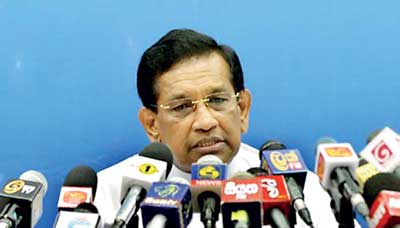Saturday Feb 28, 2026
Saturday Feb 28, 2026
Thursday, 21 December 2017 00:00 - - {{hitsCtrl.values.hits}}
By Chathuri Dissanayake
A lack of a sustainable alternative has compelled the Government to revise its plans of phasing out asbestos roofing material, Cabinet Co-Spokesperson Rajitha Senaratne said yesterday, defending the decision to defer the asbestos ban.
“Although there was a decision taken to phase out asbestos, the country has not found a suitable alternative. At present more than 80% of people use asbestos for their roofing. Until we find a suitable solution we will have to defer the ban,” Senaratne insisted. 
Senaratne accepted that there was evidence to show that asbestos dust was harmful to the environment but insisted that the reports sent in by the producers of the material from Russia have displayed that the asbestos variety – Chrysotile or white asbestos- is not harmful to people’s health.
Although the decision came hot on the heels of the Russian ban on Sri Lankan agricultural products, the reason given by both Senaratne and Plantation Industries Minister Navin Dissanayake, who was also at the weekly Cabinet press briefing, fell shy of forming a direct link between the two incidents.
“This is only a decision to overturn the decision taken not to use asbestos in Government contracts. This does not affect the private sector at all,” Minister Dissanayake insisted.
Despite refusing to draw a direct connection between the Sri Lankan move to lift the ban on asbestos with the ongoing negotiations to overturn Russia’s ban on Sri Lankan tea, Dissanayake did note that while considering the harmful effects of the material, the fate of two million workers and their families involved in the tea sector should be taken into account when a decision was made.
Insisting that the specimen found in the packaging was larvae and not even a complete insect, the Minister said that there was only one specimen of Khapra Beetle found in the Sri Lankan Museum.
“These beetles are not common in the country so we were surprised about the finding,” he said.
However, as a precaution the Ministry has already taken steps to fumigate all containers in the future at a cost of Rs. 3,000 per container, the Plantation Minister revealed.
He said that the Ministry had already written to Russian authorities and was awaiting their response on the matter. He also said that Sri Lankan tea producers and exporters adhere to very high quality control standards imposed by Europe.
“The standards are pretty high already, but if they want more steps to be taken we are happy to entertain these. We are waiting for their response,” Dissanayake said.
“At this stage we have to be very careful. Even one wrong word can work negatively for us. It is too early to say what other steps we are going to take.”
The technical team set to visit Russia has been put on standby until a response is received. However, the team already met the President on Tuesday and briefed him on the situation.
“The President’s letter to Russian President Vladimir Putin was also well-received for they are good friends and Russia has been a good friend to the country so we need to take all of that into consideration,” he said.
The team is set to meet its Russian counterparts on 27 December, he stated.